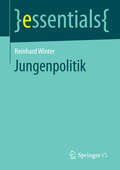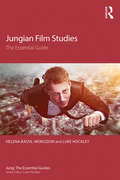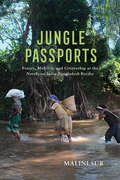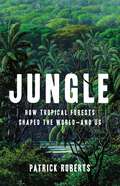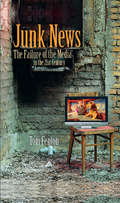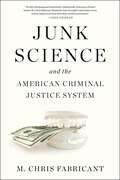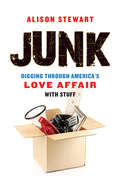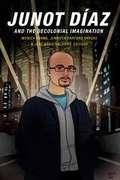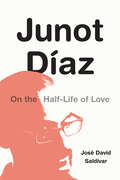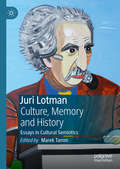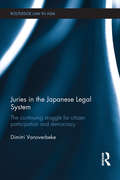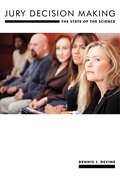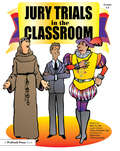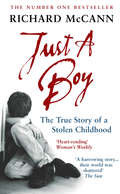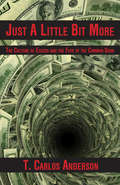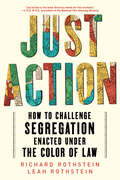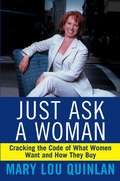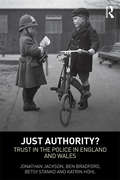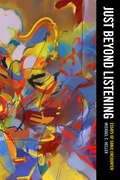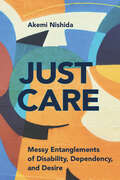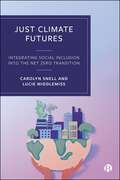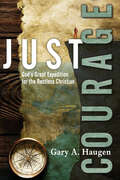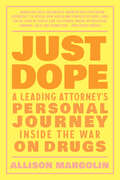- Table View
- List View
Jungenpolitik (essentials)
by Reinhard Winter,,Die" Jungen als homogene soziale Gruppe gibt es ebenso wenig wie ,,die" Benachteiligung der Jungen oder ,,die" Jungenpolitik als Rezept. Reinhard Winter beschreibt die Legitimation und reale Problempunkte der Jungenpolitik und nennt die zentralen Spannungsfelder. Jungenpolitik wird dabei als fundierter und differenzierter Ansatz positioniert, um Jungen als soziale Gruppe wie auch Untergruppen von Jungen wahrzunehmen, in problematischen Bezügen einzuschätzen, ihnen Gehör zu verschaffen und sie in ihren Ressourcen zu stärken. Dies beinhaltet eine Abgrenzung gegenüber Skandalisierungstendenzen einer vermeintlichen Jungendiskriminierung. Ein kurzer Überblick zur Verankerung der Jungenpolitik in Deutschland, Österreich und der Schweiz sowie ein Anriss jungenpolitisch relevanter Themen und Fragen runden den Beitrag ab.
Jungian Film Studies: The essential guide (Jung: The Essential Guides)
by Helena Bassil-Morozow Luke HockleyJungian film studies is a fast-growing academic field, but Jungian and post-Jungian concepts are still new to many academics and film critics. Helena Bassil-Morozow and Luke Hockley present Jungian Film Studies: The Essential Guide, the first book to bring together all the different strands, issues and arguments in the discipline, and guide the reader through the various ways in which Jungian psychology can be applied to moving images. Bassil-Morozow and Hockley cover a range of Jungian concepts including the collective unconscious, archetypes, the individuation process, alchemy, and signs and symbols, showing how they can be used to discuss the core cinematic issues such as narrative structure, gender, identity, genre, authorship, and phenomenology. The authors argue that, as a place where the unconscious and conscious meet, cinema offers the potential for imagery that is psychologically potent, meaningful, and that plays a role in our personal psychological development. This much-needed book, which bridges the space between Jungian concepts and traditional film theory, will be essential reading for scholars and students of Analytical Psychology, psychoanalysis, Jungian film studies, media, film and cultural studies, psychosocial psychology and clinical psychology. It will also appeal to analytical psychologists, psychotherapists and readers with an interest in film analysis.
Jungle Passports: Fences, Mobility, and Citizenship at the Northeast India-Bangladesh Border (The Ethnography of Political Violence)
by Malini SurSince the nineteenth century, a succession of states has classified the inhabitants of what are now the borderlands of Northeast India and Bangladesh as Muslim "frontier peasants," "savage mountaineers," and Christian "ethnic minorities," suspecting them to be disloyal subjects, spies, and traitors. In Jungle Passports Malini Sur follows the struggles of these people to secure shifting land, gain access to rice harvests, and smuggle the cattle and garments upon which their livelihoods depend against a background of violence, scarcity, and India's construction of one of the world's longest and most highly militarized border fences.Jungle Passports recasts established notions of citizenship and mobility along violent borders. Sur shows how the division of sovereignties and distinct regimes of mobility and citizenship push undocumented people to undertake perilous journeys across previously unrecognized borders every day. Paying close attention to the forces that shape the life-worlds of deportees, refugees, farmers, smugglers, migrants, bureaucrats, lawyers, clergy, and border troops, she reveals how reciprocity and kinship and the enforcement of state violence, illegality, and border infrastructures shape the margins of life and death. Combining years of ethnographic and archival fieldwork, her thoughtful and evocative book is a poignant testament to the force of life in our era of closed borders, insularity, and "illegal migration."
Jungle: How Tropical Forests Shaped the World—and Us
by Patrick Roberts"A bold, ambitious and truly wonderful history of the world"—Peter Wohlleben, author of The Hidden Life of TreesFrom the age of dinosaurs to the first human cities, a groundbreaking new history of the planet that tropical forests made. To many of us, tropical forests are the domain of movies and novels. These dense, primordial wildernesses are beautiful to picture, but irrelevant to our lives. Jungle tells a different story. Archaeologist Patrick Roberts argues that tropical forests have shaped nearly every aspect of life on earth. They made the planet habitable, enabled the rise of dinosaurs and mammals, and spread flowering plants around the globe. New evidence also shows that humans evolved in jungles, developing agriculture and infrastructure unlike anything found elsewhere. Humanity&’s fate is tied to the fate of tropical forests, and by understanding how earlier societies managed these habitats, we can learn to live more sustainably and equitably today. Blending cutting-edge research and incisive social commentary, Jungle is a bold new vision of who we are and where we come from.
Junk News
by Tom FentonIn this salient critique of the American media, veteran journalist Tom Fenton exposes the dangerous failings of our news organizations and the fundamental problems with how they present world news. Junk News is a stirring call to reform the faltering "fourth estate" and to take the blinders off our citizens for the sake of our security.Tom Fenton is a four-time Emmy Award-winning journalist and was the senior foreign correspondent for CBS News. He is the author of Bad News: The Decline of Reporting, the Business of News, and the Danger to Us All. He currently works as a BBC commentator.
Junk Science and the American Criminal Justice System
by M. Chris FabricantNow in an expanded paperback edition, Innocence Project attorney M. Chris Fabricant presents an insider’s journey into the heart of a broken, racist system of justice and the role junk science plays in maintaining the status quo. From CSI to Forensic Files to the celebrated reputation of the FBI crime lab, forensic scientists have long been mythologized in American popular culture as infallible crime solvers. Juries put their faith in "expert witnesses" and innocent people have been executed as a result. Innocent people are still on death row today, condemned by junk science. In 2012, the Innocence Project began searching for prisoners convicted by junk science, and three men, each convicted of capital murder, became M. Chris Fabricant's clients. Junk Science and the American Criminal Justice System chronicles the fights to overturn their wrongful convictions and to end the use of the "science" that destroyed their lives. Weaving together courtroom battles from Mississippi to Texas to New York City and beyond, Fabricant takes the reader on a journey into the heart of a broken, racist system of justice and the role forensic science plays in maintaining the status quo. At turns gripping, enraging, illuminating, and moving, Junk Science is a meticulously researched insider's perspective of the American criminal justice system. Previously untold stories of wrongful executions, corrupt prosecutors, and quackery masquerading as science animate Fabricant’s true crime narrative. The paperback edition features a brand-new index as well as an updated introduction and final chapter chronicling the Innocence Project’s continued fight against junk science in courtrooms across America.
Junk: Digging Through America's Love Affair with Stuff
by Alison StewartWhen journalist and author Alison Stewart was confronted with emptying her late parents' overloaded basement, a job that dragged on for months, it got her thinking: How did it come to this? Why do smart, successful people hold on to old Christmas bows, chipped knick-knacks, and books they will likely never reread? Junk details Stewart's three-year investigation into America's stuff. Stewart rides along with junk removal teams like Trash Daddy, Annie Haul, and Junk Vets. She goes backstage at Antiques Roadshow, and learns what makes for compelling junk-based television with the executive producer of Pawn Stars. And she even investigates the growing problem of space junk--23,000 pieces of manmade debris orbiting the planet at 17,500 mph, threatening both satellites and human space exploration. But it's not all dire. Readers will also learn that there are creative solutions to America's crushing consumer culture. The author visits with Deron Beal, founder of FreeCyle, an online community of people who would rather give away than throw away their no-longer-needed possessions. She spends a day at a Repair Café, where volunteer tinkerers bring new life to broken appliances, toys, and just about anything. Junk is a delightful journey through 250-mile-long yard sales, resale shops, and packrat dens, both human and rodent, that for most readers will look surprisingly familiar.
Junot Díaz and the Decolonial Imagination
by José David Saldívar Jennifer Harford Vargas Monica HannaThe first sustained critical examination of the work of Dominican-American writer Junot Díaz, this interdisciplinary collection considers how Díaz's writing illuminates the world of Latino cultural expression and trans-American and diasporic literary history. Interested in conceptualizing Díaz's decolonial imagination and his radically re-envisioned world, the contributors show how his aesthetic and activist practice reflect a significant shift in American letters toward a hemispheric and planetary culture. They examine the intersections of race, Afro-Latinidad, gender, sexuality, disability, poverty, and power in Díaz's work. Essays in the volume explore issues of narration, language, and humor in The Brief Wondrous Life of Oscar Wao, the racialized constructions of gender and sexuality in Drown and This Is How You Lose Her, and the role of the zombie in the short story "Monstro." Collectively, they situate Díaz's writing in relation to American and Latin American literary practices and reveal the author's activist investments. The volume concludes with Paula Moya's interview with Díaz.Contributors: Glenda R. Carpio, Arlene Dávila, Lyn Di Iorio, Junot Díaz, Monica Hanna, Jennifer Harford Vargas, Ylce Irizarry, Claudia Milian, Julie Avril Minich, Paula M. L. Moya, Sarah Quesada, José David Saldívar, Ramón Saldívar, Silvio Torres-Saillant, Deborah R. Vargas
Junot Díaz: On the Half-Life of Love
by José David SaldívarIn Junot Díaz: On the Half-Life of Love, José David Saldívar offers a critical examination of one of the leading American writers of his generation. He explores Díaz’s imaginative work and the diasporic and immigrant world he inhabits, showing how his influences converged in his fiction and how his writing—especially his Pulitzer Prize--winning novel The Brief Wondrous Life of Oscar Wao—radically changed the course of US Latinx literature and created a new way of viewing the decolonial world. Saldívar examines several aspects of Díaz’s career, from his vexed relationship to the literary aesthetics of Whiteness that dominated his MFA experience and his critiques of the colonialities of power, race, and gender in culture and societies of the Dominican Republic, United States, and the Américas to his use of the science-fiction imaginary to explore the capitalist zombification of our planet. Throughout, Saldívar shows how Díaz’s works exemplify the literary currents of the early twenty-first century.
Juri Lotman - Culture, Memory and History: Essays in Cultural Semiotics
by Marek TammThis volume brings together a selection of Juri Lotman’s late essays, published between 1979 and 1995. While Lotman is widely read in the fields of semiotics and literary studies, his innovative ideas about history and memory remain relatively unknown. The articles in this volume, most of which are appearing in English for the first time, lay out Lotman’s semiotic model of culture, with its emphasis on mnemonic processes. Lotman’s concept of culture as the non-hereditary memory of a community that is in a continuous process of self-interpretation will be of interest to scholars working in cultural theory, memory studies and the theory of history.
Juries in the Japanese Legal System: The Continuing Struggle for Citizen Participation and Democracy (Routledge Law in Asia)
by Dimitri VanoverbekeTrial by jury is not a fundamental part of the Japanese legal system, but there has been a recent important move towards this with the introduction in 2009 of the lay assessor system whereby lay people sit with judges in criminal trials. This book considers the debates in Japan which surround this development. It examines the political and socio-legal contexts, contrasting the view that the participation of ordinary citizens in criminal trials is an important manifestation of democracy, with the view that Japan as a society where authority is highly venerated is not natural territory for a system where lay people are likely to express views at odds with expert judges. It discusses Japan’s earlier experiments with jury trials in the late 19th Century, the period 1923-43, and up to 1970 in US-controlled Okinawa, compares developing views in Japan on this issue with views in other countries, where dissatisfaction with the jury system is often evident, and concludes by assessing how the new system in Japan is working out and how it is likely to develop.
Jury Decision Making: The State of the Science (Psychology and Crime #8)
by Dennis J. DevineWhile jury decision making has received considerable attention from social scientists, there have been few efforts to systematically pull together all the pieces of this research. In Jury Decision Making, Dennis J. Devine examines over 50 years of research on juries and offers a "big picture" overview of the field. The volume summarizes existing theories of jury decision making and identifies what we have learned about jury behavior, including the effects of specific courtroom practices, the nature of the trial, the characteristics of the participants, and the evidence itself. Making use of those foundations, Devine offers a new integrated theory of jury decision making that addresses both individual jurors and juries as a whole and discusses its ramifications for the courts.Providing a unique combination of broad scope, extensive coverage of the empirical research conducted over the last half century, and theory advancement, this accessible and engaging volume offers "one-stop shopping" for scholars, students, legal professionals, and those who simply wish to better understand how well the jury system works.
Jury Trials in the Classroom: Grades 5-8
by Betty M. SeeTransform your classroom into a courtroom and get ready for students to take part in a great learning adventure. The six trial simulations in this book let students delve into criminal and civil law with motivating cases that mirror situations in fairy tales, nursery rhymes, literature, and history. In the roles of attorneys, members of the jury, defendants, witnesses, and courtroom personnel, students prepare and conduct cases. They will learn to use statements of fact and witness affidavits to determine guilt or innocence.The book is divided into three sections that: define the types of courts in the U.S. court system; explain how to carry out a mock trial; and give six ready-to-use court cases, including all necessary documents. The court cases allow students to understand both criminal and civil trials, with three types of each case. The cases allow you to stage trials involving Hansel and Gretel, John Wilkes Booth, Little Miss Muffet, Romeo and Juliet, Jack and Jill, and Little Red Riding Hood. Don't miss this opportunity to teach critical thinking and teach students how to weigh opposing points of view. The exciting results will motivate students to exercise their reasoning skills, polish their communication skills, and apply knowledge of the legal system. This will become one of your favorite classroom adventures.For more judicial activities, see Blind Justice and On Trial.Grades 5-8
Just A Boy: The True Story Of A Stolen Childhood
by Richard McCannOne October night in 1975 Richard, aged five, was alone in the house with his three sisters. It was 3am and their mother hadn't come home yet. Next morning, the police arrived to take the children away. Their mother had become the first victim of a serial killer soon to become known as the 'Yorkshire Ripper'. Passed from one violent home to another, the children were forgotten by all except the press. As the salacious headlines multiplied, Richard and his sisters were never able to recover from their mother's murder. Whilst Richard tried to handle the terror of his violent upbringing, his sister struggled to deal with memories of sexual abuse. Without love or support they spiralled away from help or happiness. Then one day Richard McCann, having reached suicidal rock bottom, decided no one was going to rescue their lives but him. It was the beginning of an inspirational transformation. Now he is able to tell the story of how the forgotten children of violence suffer, and how they can heal. A heartbreaking, uplifting story of survival and hope.
Just A Little Bit More: The Culture of Excess and the Fate of the Common Good
by T. Carlos AndersonIs America a Christian Nation? According to author T. Carlos Andersen, the true religion of the land is the confluence of commerce, materialism, and consumerism. Andersen, defining religion as "ultimate concern," claims our true devotion is found in material pursuits. It's been a good religion; it has fed, clothed, sheltered, and employed millions of Americans. It can go too far, however. When these pursuits become excessive, the religion breaks bad and the common good suffers.
Just A Mom
by Betty DegeneresThe mother of comedian Ellen DeGeneres explains ways parents can help themselves and their homosexual children to deal with homosexuality.
Just Action: How to Challenge Segregation Enacted Under the Color of Law
by Richard Rothstein Leah RothsteinThe Color of Law brilliantly recounted how government at all levels created segregation. Just Action describes how we can begin to undo it. In his best-selling book The Color of Law, Richard Rothstein demolished the de facto segregation myth that black and white Americans live separately by choice, providing “the most forceful argument ever published on how federal, state, and local governments gave rise to the reinforced neighborhood segregation” (William Julius Wilson). This landmark work—through its nearly one million copies sold—has helped to define the fractious age in which we live. The Color of Law’s unrefuted account has become conventional wisdom. But how can we begin to undo segregation’s damage? “It’s rare for a writer to feel obligated to be so clear on solutions to the problems outlined in a previous book,” writes E. J. Dionne, yet Richard Rothstein—aware that twenty-first-century segregation continues to promote entrenched inequality—has done just that, teaming with housing policy expert Leah Rothstein to write Just Action, a blueprint for concerned citizens and community leaders. As recent headlines informed us, twenty million Americans participated in racial justice demonstrations in 2020. Although many displayed “Black Lives Matter” window and lawn signs, few considered what could be done to redress inequality in their own communities. Page by page, Just Action offers programs that activists and their supporters can undertake in their own communities to address historical inequities, providing bona fide answers, based on decades of study and experience, in a nation awash with memes and internet theories. Often forced to respond to social and political outrage, banks, real estate agencies, and developers, among other institutions, have apologized for past actions. But their pledges—some of them real, others thoroughly hollow—to improve cannot compensate for existing damage. Just Action shows how community groups can press firms that imposed segregation to finally take responsibility for reversing the harm, creating victories that might finally challenge residential segregation and help remedy America’s profoundly unconstitutional past.
Just Ask a Woman: Cracking the Code of What Women Want and How They Buy
by Mary Lou QuinlanAuthor shows marketers and business leaders how to tap into America's most powerful consumers: women. Although they comprise just over half of the U.S. population, women buy or influence the purchase of eighty-five percent of all products and services.
Just Authority?: Trust in the Police in England and Wales
by Ben Bradford Jonathan Jackson Betsy Stanko Katrin HohlWhat does it mean to trust the police? What makes the police legitimate in the eyes of the policed? What builds trust, legitimacy and cooperation, and what undermines the bond between police and the public? These questions are central to current debates concerning the relationship between the British police and the public it serves. Yet, in the context of British policing they are seldom asked explicitly, still less examined in depth. Drawing on psychological and sociological explanatory paradigms, Just Authority? presents a cutting-edge empirical study into public trust, police legitimacy, and people’s readiness to cooperate with officers. It represents, first, the most detailed test to date of Tom Tyler’s procedural justice model attempted outside the United States. Second, it uncovers the social ecology of trust and legitimacy and, third, it describes the relationships between trust, legitimacy and cooperation. This book contains many important lessons for practitioners, policy-makers and academics. As elsewhere the dominant vision of policing in Great Britain continues to stress instrumental effectiveness: the ‘fight against crime’ will be won by pro-active and even aggressive policing. In line with work from the United States and elsewhere, Just Authority? casts significant doubt on such claims. When people find policing to be unfair, disrespectful and careless of human dignity, not only is trust lost, legitimacy is also damaged and cooperation is withdrawn as a result. Absent such public support, the job of the police is made harder and the avowed objectives of less crime and disorder placed ever further from reach.
Just Beyond Listening: Essays of Sonic Encounter (California Studies in Music, Sound, and Media #5)
by Michael C. HellerJust Beyond Listening asks how we might think about encounters with sound that complicate standard accounts of aurality. In a series of essays, Michael C. Heller considers how sound functions in dialogue with a range of sensory and affective modalities, including physical co-presence, textual interference, and spectral haunting. The text investigates sound that is experienced in other parts of the body, altered by cross-wirings of the senses, weaponized by the military, or mediated and changed by cultural practices and memory. Building on recent scholarship in sound studies and affect theory, Heller questions not only how sound propagates acoustically but how sonic presences temper our total experience of the world around us.
Just Care: Messy Entanglements of Disability, Dependency, and Desire (D/C: Dis/color)
by Akemi NishidaJust Care is Akemi Nishida’s thoughtful examination of care injustice and social justice enabled through care. The current neoliberal political economy has turned care into a business opportunity for the healthcare industrial complex and a mechanism of social oppression and control. Nishida analyzes the challenges people negotiate whether they are situated as caregivers, receivers, or both. Also illuminated is how people with disabilities come together to assemble community care collectives and bed activism (resistance and visions emerging from the space of bed) to reimagine care as a key element for social change. The structure of care, Nishida writes, is deeply embedded in and embodies the cruel social order—based on disability, race, gender, migration status, and wealth—that determines who survives or deteriorates. Simultaneously, many marginalized communities treat care as the foundation of activism. Using interviews, focus groups, and participant observation with care workers and people with disabilities, Just Care looks into lives unfolding in the assemblage of Medicaid long-term care programs, community-based care collectives, and bed activism. Just Care identifies what care does, and asks: Are some people’s needs more sacred and urgent than others?
Just Care: Messy Entanglements of Disability, Dependency, and Desire (D/C: Dis/color)
by Akemi NishidaJust Care is Akemi Nishida’s thoughtful examination of care injustice and social justice enabled through care. The current neoliberal political economy has turned care into a business opportunity for the healthcare industrial complex and a mechanism of social oppression and control. Nishida analyzes the challenges people negotiate whether they are situated as caregivers, receivers, or both. Also illuminated is how people with disabilities come together to assemble community care collectives and bed activism (resistance and visions emerging from the space of bed) to reimagine care as a key element for social change. The structure of care, Nishida writes, is deeply embedded in and embodies the cruel social order—based on disability, race, gender, migration status, and wealth—that determines who survives or deteriorates. Simultaneously, many marginalized communities treat care as the foundation of activism. Using interviews, focus groups, and participant observation with care workers and people with disabilities, Just Care looks into lives unfolding in the assemblage of Medicaid long-term care programs, community-based care collectives, and bed activism. Just Care identifies what care does, and asks: How can we activate care justice or just care where people feel cared affirmatively and care being used for the wellbeing of community and for just world making?
Just Climate Futures: Integrating Social Inclusion Into the Net Zero Transition
by Lucie Middlemiss Carolyn SnellIf we are to meet ‘Net Zero’ targets, both climate policies and our daily lives require significant change. The transition towards Net Zero will lead to inevitable trade-offs between social, economic and environmental objectives, and this transition could disproportionately impact households already struggling with poverty and precarity. This book takes a deep dive into the ways families and communities are, or could be, impacted by the implementation of climate policy. It demonstrates that participation in Net Zero requires people to be economically, culturally, socially and politically engaged ̶ and provides a practical roadmap to encourage and support a truly just transition.
Just Courage: God's Great Expedition for the Restless Christian
by Gary A. Haugen"There must be more to the Christian life than this—more than church each Sunday and waving to my neighbors and giving some clothes to Goodwill when I go through my closet each spring." These aren't bad things, of course. But they're safe and comfortable and easy. And there's a reason they're not satisfying your desire for something more significant and meaningful—we're created by God for adventure. International Justice Mission president Gary Haugen has found that engaging in the fight for justice is the most deeply satisfying way of life. This book shows how we too can be a part of God's great expedition.
Just Dope: A Leading Attorney's Personal Journey Inside the War on Drugs
by Allison MargolinFor readers of Dopesick and In the Realm of Hungry Ghosts, a celebrated cannabis attorney's personal look at the War on Drugs and what comes next for the drug legalization movementGetting high is something most of us do, and in many cases do safely--yet drugs remain a singular public enemy. In a ranging blend of memoir, pop culture, policy critique, and social analysis, LA-based criminal defense attorney Allison Margolin explores why--and what we can do about it.Informed by Margolin&’s experiences as a drug user, advocate, and the daughter of California&’s most renowned (and infamous) cannabis attorney, Just Dope offers a look at where our current drug policy fails. It exposes the true history of drug prohibition in the United States, sharing why it started, how it evolved, and where it stands now. And it looks unflinchingly at the false dichotomy between &“good&” drugs and &“bad&” drugs and Margolin&’s experience with programs like D.A.R.E that misguidedly ask you to &“Just Say No.&”For readers of All Day is a Long Time and In the Realm of Hungry Ghosts, Just Dope is an experiential tour-de-force of personal essay and whip-smart policy critique—and a vital call to knowledge and action.
